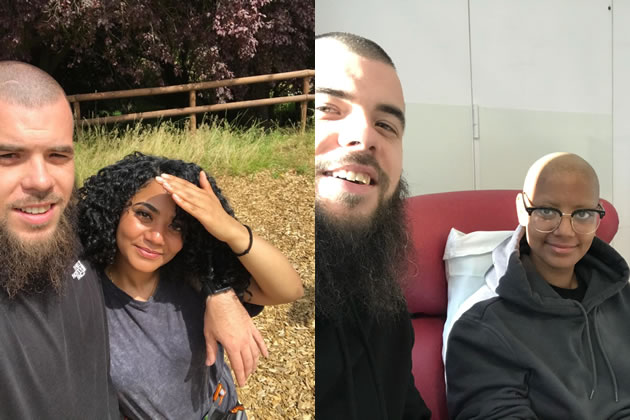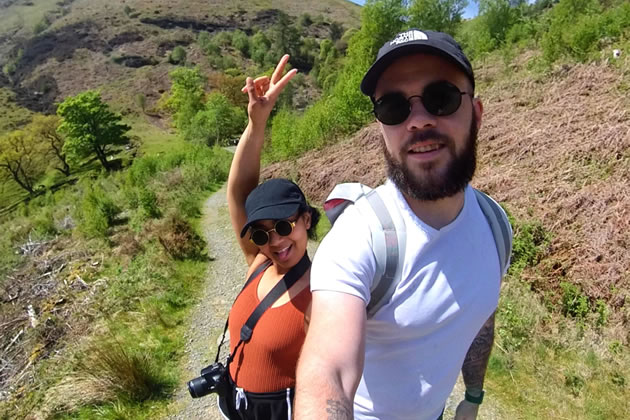First symptom for Nayfil Hussein was severe headaches

Nayfil with her husband Paul before and after her diagnosis
A 32-year-old woman from Southall is stepping out for a Walk of Hope after her terrifying diagnosis with a brain tumour.
Motivated by her own dreadful experience, Nayfil Hussein is taking part the walk to raise funds for Brain Tumour Research. She and her husband Paul are organising a five-hour circular walk around Hampstead Heath in North London.
Nayfil, who works for Costa Coffee in Chancery Lane as a digital product owner, was diagnosed with a medulloblastoma in June 2019, after suffering from severe headaches, which she initially thought were hormone-related.
She said, “I’ve had bad headaches since I was a teenager. I’ve always thought they were related to my monthly cycle and I would take painkillers to manage them. I never imagined they would turn out to be a symptom of a brain tumour.
“I used to live in Luton in Bedfordshire and would commute into London every day. One day, in May 2019, I was getting sharp pains in my brain and spine while I was on the train. It felt as if my brain was on fire. I walked the 15 minutes from Farringdon station to my office and when I arrived, I still felt awful and had to leave after just five minutes. This happened a number of times for a period of about two weeks.”
Later that month, Nayfil was on a flight to Greece with her husband Paul and his family, when she became unwell with a headache, which got increasingly worse throughout her trip.
She said, “I had to stay in bed for most of the holiday. It was different to my regular headaches and lasted eight days. I took painkillers to try to manage it, to no avail. In desperation, I called my GP and was advised to ‘ride it out’. I was also throwing up every morning and my vision was affected too.”
Once she got back to the UK, Nayfil felt better for a few days, before things began deteriorating again.
She said, “The pain came back with full force and I was stuck on the sofa, unable to get up. I mustered all the strength I had to walk the short distance across the road to A&E at Ealing Hospital’s. I waited for nearly five hours before I was admitted, as I was completely immobilised by the pain. I had various scans, blood tests and a lumbar puncture but they were unable to find the cause of my symptoms.”
A few days later, as her symptoms persisted, Nayfil was admitted back into Ealing Hospital and after further tests, an MRI scan revealed a brain tumour, the size of a golf ball. Her case was then referred to Charing Cross Hospital in Hammersmith, where at the end of July 2019, she had 11-hour brain surgery to remove the tumour.
Nayfil said, “Before I was taken into theatre, I had to have some of my hair shaved off, which was really traumatic. My hair was my pride and joy – big and curly. I really loved it. Seeing it falling to the floor in chunks was really distressing and brought me to tears.”
Fortunately, Nayfil’s operation was a success, as her surgeon was able to remove the tumour and she was fitted with a shunt, to drain the excess fluid in her brain. The results from the biopsy confirmed the tumour was a medulloblastoma, the most common type of high-grade paediatric brain tumour, more common in boys than girls and rare in adults.
Nayfil said, “The bad news was that the cancer had also spread into my spine, so, in September 2019 I began seven weeks of intense radiotherapy, targeting the back of my head and spine. The treatment caused severe side effects, including seizures, nausea, fatigue and horrible mouth ulcers. I lost a lot of weight. I was 67kg when I received my diagnosis and at my lightest, I was just 44kg, making me clinically underweight.”
Nayfil had a month’s break after her radiotherapy, before starting vincristine and cisplatin chemotherapy on 3 December 2019. She completed two out of seven rounds of the chemo when, in March 2020, the Covid-19 pandemic hit and her treatment was halted.
She said, “This came as a blessing in disguise, as I was able to get some respite from the horrendous side effects. My oncologist was happy for me to stop the treatment altogether, as the results from my MRI scans showed that the radiotherapy had worked. It was a relief to finally be able to start recovering properly from the harsh treatment regime.”
In September 2020 Nayfil was well enough to go back to work on a phased return and by January 2021, she resumed her full-time hours, which marked a significant milestone in her recovery.

Nayfil and Paul on holiday in Wales after her treatment
Now she has to have four-monthly scans to monitor her condition and she continues to take anti-seizure medication as well as regular blood tests to check her hormone and white blood cells levels. She still speaks to her oncologist regularly and he is happy with the way things are going.
She says “I do worry that my tumour might come back and if it does, I fear that it will be terminal. I’ve always wanted to have kids but that is now out of the question due to the impact of the treatment I’ve had. I did, however, have my eggs frozen before my surgery, so surrogacy is potentially an option but this is something Paul and I would have to give a lot of thought to. My attitude now is to try to enjoy life and live in the present.”
“As well as raising money, I want to help increase awareness of the disease and to give something back. For me, it will be a real physical challenge. Before my diagnosis, I climbed Mount Snowdon but since finding out I had a brain tumour, I’ve lost a lot of fitness. I want to get back to being active and this walk will hopefully help me to get there and will mark another key milestone on my long road to recovery.”
The walk on Saturday 25 September, is one of many similar events taking place across the UK for the charity Brain Tumour Research. Participants will help to create a ‘sea of pink’ in their emoji t-shirts to help find a cure for brain tumours. The Walk of Hope went virtual for the first time last year and, despite the challenges posed by COVID-19, raised more than £194,000 to help fund the fight.
Brain tumours kill more children and adults under the age of 40 than any other cancer yet historically just 1% of the national spend on cancer research has been allocated to this devastating disease.
Matthew Price, community development manager for Brain Tumour Research said, “We were so sorry to learn about Zara’s diagnosis and wish her all the best for the rest of her treatment and forthcoming scans.
“Zara’s powerful story reminds us that brains tumours are indiscriminate; they can affect anyone at any time. We are so grateful to her and her family for supporting our cause and for committing to fundraising for Brain Tumour Research long-term. We remain focused on finding a cure, to help prevent more families from having their lives turned upside-down by this terrible disease.”
Brain Tumour Research funds sustainable research at dedicated centres in the UK. It also campaigns for the Government and the larger cancer charities to invest more in research into brain tumours in order to speed up new treatments for patients and, ultimately, to find a cure. The charity is calling for a national annual spend of £35 million in order to improve survival rates and patient outcomes in line with other cancers such as breast cancer and leukaemia and is also campaigning for greater repurposing of drugs.
To make a donation to Brain Tumour Research in support of Nayfil, click here.
Like Reading Articles Like This? Help Us Produce More This site remains committed to providing local community news and public interest journalism. Articles such as the one above are integral to what we do. We aim to feature as much as possible on local societies, charities based in the area, fundraising efforts by residents, community-based initiatives and even helping people find missing pets. We’ve always done that and won’t be changing, in fact we’d like to do more. However, the readership that these stories generates is often below that needed to cover the cost of producing them. Our financial resources are limited and the local media environment is intensely competitive so there is a constraint on what we can do. We are therefore asking our readers to consider offering financial support to these efforts. Any money given will help support community and public interest news and the expansion of our coverage in this area. A suggested monthly payment is £8 but we would be grateful for any amount for instance if you think this site offers the equivalent value of a subscription to a daily printed newspaper you may wish to consider £20 per month. If neither of these amounts is suitable for you then contact info@neighbournet.com and we can set up an alternative. All payments are made through a secure web site. One-off donations are also appreciated. Choose The Amount You Wish To Contribute. If you do support us in this way we’d be interested to hear what kind of articles you would like to see more of on the site – send your suggestions to the editor. For businesses we offer the chance to be a corporate sponsor of community content on the site. For £30 plus VAT per month you will be the designated sponsor of at least one article a month with your logo appearing if supplied. If there is a specific community group or initiative you’d like to support we can make sure your sponsorship is featured on related content for a one off payment of £50 plus VAT. All payments are made through a secure web site. |
September 9, 2021